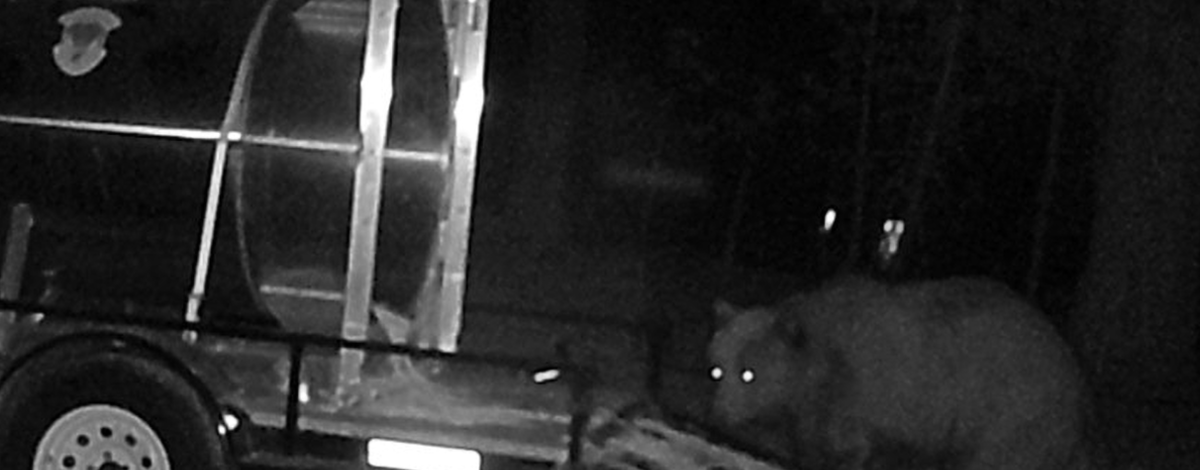Events of April 5
A grizzly bear was suspected to have killed a llama and a sheep on the evening of April 5 near the town of Naples in North Idaho.
Some information was circulating that the incident occurred near Athol, which is incorrect. The incident occurred southwest of the town of Naples in Boundary County.
After arriving on the scene on April 6 and locating grizzly bear tracks, Idaho Fish and Game staff along with staff from Wildlife Services placed traps on the property, anticipating that the bear may return.
There was no bear activity on the property on April 6 and 7, but the bear returned sometime in the early morning hours of April 8.
Events of April 8
Fish and Game staff were notified by the landowners early in the morning of April 8 that the bear had returned and killed additional livestock.
Officers confirmed that two additional sheep and a goat were killed overnight. In addition, Fish and Game staff checked game cameras that had been set at the site on April 6 and confirmed the culprit as a grizzly bear.
Based on the photos and videos, it is unclear if the bear has been encountered during previous management or research efforts or if it is a previously undocumented animal.
What Fish and Game is doing
Fish and Game officers, in coordination with a trapper from Wildlife Services, have placed additional traps on the residents’ property. If the grizzly bear is successfully trapped, staff will make a final confirmation whether or not the bear has been encountered before or if it is a previously undocumented animal by checking for ear tags and other identifying markers.
If the grizzly bear is captured, Fish and Game will work with U.S. Fish and Wildlife Service staff to collect biological data including DNA, measurements, sex and age. If the bear is relocated, a GPS collar will be placed on it for future tracking of its movements and behaviors.
Fish and Game staff are working with the landowners to take additional steps to protect the remaining livestock including:
- Removal of all animal carcasses,
- Securing of attractants, where feasible and
- Corralling of remaining livestock inside of an electrified fence.
Did you know?
Two Fish and Game employees are largely dedicated to grizzly bear-related education, management and incidents in the Panhandle Region. The first is a Grizzly Bear Enforcement and Education Senior Conservation Officer, and the second is a Grizzly Bear Management Technician.
The positions exist to provide to provide education and technical support for all things related to grizzly bears, including bear-human conflicts, and they are based out of Boundary County. As part of their program, supplies and support can be provided to landowners to help address grizzly bear-human conflicts.
Landowners can request technical support pertaining to securing bear attractants (e.g., bear-proof trash cans), supplies for protecting livestock (e.g., electrified and permanent fencing) and a variety of educational materials for “living in bear country” by contacting the Panhandle Regional office at (208) 769-1414.
Important reminders
We’ve said it before but it can’t be said enough, there are some simple steps homeowners and landowners can take to make their properties less attractive to bears and reduce the likelihood of potential problems.
- Properly dispose of attractants, including trash, animal carcasses and compost.
- Securely store food, livestock forage, bee hives, and other attractants in a bear-resistant place.
- Keep pet food secured as you do your own. Bears like pet food as much as your pet does.
- Avoid filling bird feeders until wintertime.
- Do not bury or throw garbage into the nearby woods.
- Make sure to clean your grills and keep them in a building, if possible.
- If you have livestock, secure them overnight in a barn, or corral them in an electrified fence, if possible.
In addition, here are a few tips in the event you do encounter a bear:
- Never approach bears, always stay at least 300 feet away.
- Do not interrupt bear activities.
- Never feed bears.
- Carry bear spray and know how to use it.
- Never run if you encounter a bear.
- Know the difference between a defensive encounter and a predatory encounter and how to respond in each situation. Check out this helpful video for details.
For more information or if you have questions, please contact the Panhandle Regional office.
You can also follow the Panhandle Region Facebook page to get regular news and updates.

